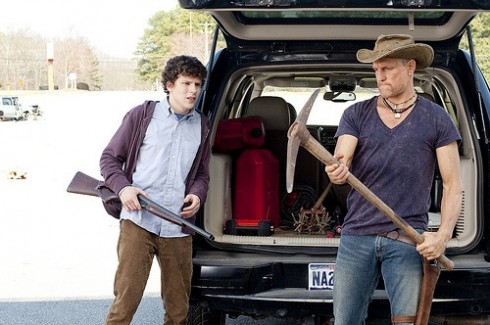Fleischer ’97 Makes Feature Film Debut with Zombieland

The hit movie Zombieland marks the directorial debut of Ruben Fleischer ’97 and was number one at the box office when it opened nationwide on October 2.
During its opening weekend, the film sold $25 million worth of tickets in the U.S. and Canada and cost Columbia (Sony) Pictures and co-financier Relativity Media only $23.6 million to produce. It has remained in the top 10 films at the box office in the weeks that followed. The film also was notable for ending a recent trend of poor openings for movies with horror elements such as Jennifer’s Body and Sorority Row.
Zombieland stars Woody Harrelson, Jesse Eisenberg, Emma Stone, and Abagail Breslin as four quirky characters who join forces to battle flesh eaters as they head for Southern California, a supposedly zombie-free zone. The film’s popularity may in part be attributed to its combination of genres; the film mixes elements of an action-adventure, a road movie, a buddy comedy, a love story, and, of course, a zombie movie, which broadens its appeal beyond zombie film fanatics.
In her review in Entertainment Weekly, Lisa Schwarzbaum wrote: “Zombieland is a polished, very funny road picture shaped by wisenheimer cable-TV sensibilities and starring four likable actors, each with an influential following.”
Fleischer majored in history at Wesleyan and worked on various web sites after graduation. He then landed a job as a production assistant on Dawson’s Creek, where he was mentored by writer Mike White ’92 who helped him get a job as assistant to Miguel Arteta ’89, who was directing the film Chuck & Buck (written by White). Fleischer also worked with Arteta on his next feature The Good Girl. He also directed music videos and commercials, produced the MTV cult hit Rob & Big, directed episodes of Jimmy Kimmel Live, and filmed behind-the-scenes footage for Borat.
Fleischer was recently profiled in The Washington Post by Ann Hornaday and commented on why zombie movies continue to attract audiences. He said: “In a way, zombies are expressing anxieties that we have about ourselves as a people… the more-modern zombie movies are more of a statement about our society, where there’s a lot of anxiety about pandemics and viral diseases, and there’s concern about our food supply and contamination and the way the environment is being threatened. It’s just general anxiety about the future and what catastrophes could possibly happen.”

